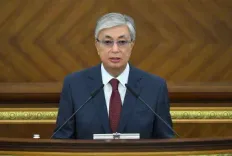Did the Lok Sabha Just Pass the Online Gaming Bill Without Debate?

Synopsis
Key Takeaways
- The Lok Sabha passed the Online Gaming Bill without debate.
- The bill aims to regulate online money games to combat issues like addiction.
- Violations can result in severe penalties, including imprisonment.
- A national Online Gaming Authority is proposed for oversight.
- Concerns over transparency and the legislative process have arisen.
New Delhi, Aug 20 (NationPress) The Lok Sabha has officially passed the Promotion and Regulation of Online Gaming Bill, 2025, via a voice vote, circumventing any discussion amidst strong protests from Opposition members who demanded a debate on the Special Intensive Revision (SIR) of voter rolls in Bihar.
Introduced by Union Minister for Electronics and Information Technology Ashwini Vaishnaw, this legislation intends to regulate India's flourishing online gaming industry while imposing restrictions on online money games. Despite Speaker Om Birla's persistent calls for dialogue—including an offer of 18 hours of discussion time—the Opposition stood firm on prioritizing the voter list matter, resulting in a tumultuous walkout.
This bill was passed without any debate.
In his address, Vaishnaw highlighted the necessity for a well-structured framework to manage the swiftly growing digital gaming landscape. He divided the sector into three categories: e-sports, social games, and online money games. While the first two were commended for encouraging logic, learning, and entertainment, the third—online money gaming—was criticized for promoting addiction, financial hardship, and fraud.
Quoting a recent report from Karnataka, the minister stated that 32 lives had been lost due to incidents related to money gaming in just a few months. He also referenced the World Health Organisation's classification of gaming disorder as a psychological condition.
The bill defines an “online money game” as any game played by depositing money or stakes with the expectation of monetary returns, regardless of whether it is based on skill, chance, or both. E-sports are specifically excluded from this definition.
The legislation forbids the offering, operation, facilitation, advertisement, and financial transactions related to such games. Breaching this law could result in imprisonment of up to three years and fines reaching Rs 1 crore.
Vaishnaw assured that the bill places middle-class welfare at the forefront, aligning with Prime Minister Narendra Modi's commitment to safeguard vulnerable populations from exploitative digital platforms. The bill also proposes the establishment of a national Online Gaming Authority to oversee compliance, foster innovation, and ensure responsible use of digital technologies.
As the bill heads to the Rajya Sabha, it has ignited a nationwide dialogue on digital ethics, consumer protection, and the future of India's gaming economy.







